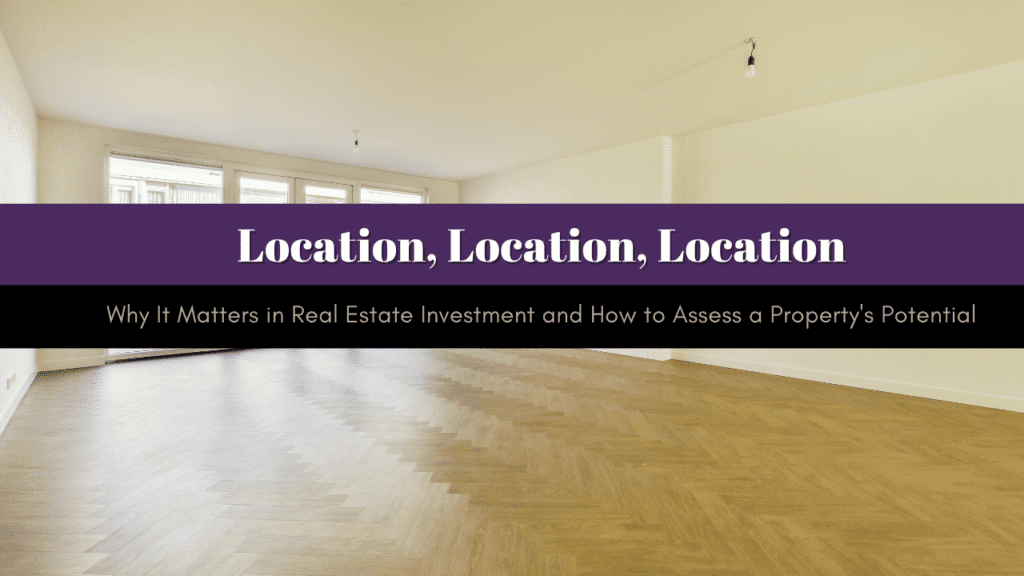
Sometimes, you can work around the flaws in your investment property.
The roof is falling apart? Replace it.
The appliances are aging faster than a bad joke? Install some energy-efficient models that look great and work well.
What can you do about a bad location?
Not much.
Location matters. You don’t have to be an experienced real estate investor to know this. It matters when you’re buying a property, it matters when you’re selling a property, and it surely matters when you’re trying to rent out a property. It especially matters when your goal is to rent out that property for the most money possible, and to the best residents possible.
“Buy land, they’re not making it anymore.”
-Mark Twain
He wasn’t wrong. Finding a great piece of real estate is great. Finding a great piece of real estate that’s well-located is even better. You can make any changes to the property that you want. What you cannot change is the ground it’s on. Location matters, and it matters a lot.
Let’s take a deeper look at why location really matters, and what it means for your current and future real estate investments. This will be especially valuable information when you’re assessing whether a potential property is the right one to buy.
WHY DOES LOCATION MATTER SO MUCH IN RESIDENTIAL RENTAL REAL ESTATE?
We can identify two immediate reasons that location matters when you own residential real estate: It impacts what you pay for your investment property; and, it impacts what you earn when you rent out that investment property.
You know how it works. Prices are often a reflection of supply and demand. And, real estate appreciates based on the market. This means that an investment property’s location alone will make a property more or less desirable to both buyers and tenants. That will impact its price. As demand increases, so do prices.
|
Location and What You PAY
As you’re shopping around for just the right investment property, you fully expect that you’ll pay more for properties that are in excellent locations. No one wants to buy the homes that are hard to reach out there in more remote areas or drowning in the middle of heavily trafficked or industrial areas. This is especially true if they’re buying in order to rent those properties out. As an investor, you have a budget and that budget should include what you’re willing to pay for the right location. It’s worth it to pay a bit more than you wanted when you find a property in just the right neighborhood. Location and What You EARN
Paying more for a well-located property isn’t so bad, however. It might sting when you’re closing the deal, but remember the opportunities it offers you. A higher property price likely reflects the location. When you buy in a well-desired area, you know that you can easily earn higher rents. Just like in the sales market, tenants are willing to pay more in rent when they find a home that’s perfectly located. It’s safe to say that a property’s location has a larger impact on home and rental prices than anything else. |
When you purchase a residential investment property, the amount of rent you can charge will depend on that property’s location and how convenient it is for your tenants. Just like buyers, the renters you’re working hard to attract will want easy access to schools, their favorite grocery stores, restaurants, and entertainment. They want to be close to parks and recreation.
The more you have to offer renters, the higher your rents, and it starts with location.
Supply and Demand Affects Appreciation and ROI
Let’s not forget the power of basic economics, such as the principle of supply and demand. This is another reason that location is so important when it comes to real estate and investment properties.
Think about it in terms of how your property increases in value. Supply and demand are two factors that will always impact real estate appreciation. Housing supply in fantastic locations is limited to the number of homes in that location. Even with new construction providing additional options for buyers and renters, the best locations fill up fast. The right location creates desirability and a sense of competition. That raises real estate prices and translates to higher home values and rental values for you.
You’re not going to earn more when your property is in a terrible location. You will earn more when it’s in the right location.
LOCATION AND YOUR CURRENT INVESTMENT PROPERTIES: IS IT HELPING OR HURTING?
What to Do

If you’re constantly evaluating what you earn on your existing portfolio (and you’d better be), you’ll notice which properties are performing better than expected and which are beginning to set off some alarm bells.
As you dig deeper into the results you’re seeing for a specific property, take a look at its location. Has the neighborhood changed? Is it deteriorating, shifting into something less residential and more industrial? Is there a highway planned or environmental concerns? All of these issues will have an impact on your property’s value and performance.
A declining neighborhood risks your:
- Rental income
- Property value
- Tenant quality
- Vacancy rate
You might be thinking about an exit strategy, but even that can be in danger when your property is in a less-than-desirable location and other investors and buyers know it.
What are your options when you’ve decided that a property isn’t contributing what you need to your portfolio, and you know that it’s due to the property’s location?
| Option 1: Sell
Maybe it’s an easy decision for you, and you just want to sell. Do it. Make the property as attractive as you possibly can; it will go a long way in keeping your potential buyer’s attention on the home itself and not the location. You may want to focus on a homebuyer rather than another real estate investor. Someone looking for a home that they plan to live in themselves will be looking at properties within a specific budget, and they might be more willing to make some concessions when it comes to location in order to close the deal at a price they like. Option 2: Hold While a less than ideal location does hurt, it does not have to destroy your investment goals completely. Consider what you’re earning versus what you’re spending. If you’re still seeing some cash flow and if you’re not spending more than you’re comfortable spending on maintenance, repairs, and turnovers, there is a case to be made for keeping that property. Maybe you have a tenant in place who has shown no signs of leaving. That means you have some consistent and reliable rental income and you don’t have to worry about marketing a rental that isn’t in the best neighborhood. Option 3: 1031 Exchange Can you trade this property in for another rental home that’s in a better neighborhood? Actually, you can. There will be a few specific steps you need to take, and you’ll have some tight deadlines to meet. But, if you want to get rid of the property with the location you don’t love, you can sell it and save on taxes by reinvesting that money earned into another investment property. Maybe one in a better neighborhood. Talk to your property manager and your accountant about a 1031 exchange. |
Leverage Likable Locations
Maybe your rental property’s location isn’t hurting you at all. Maybe it’s helping. Are there more people moving into your area? Does everyone suddenly want to be in the neighborhood where you happen to own a rental property?
Great news.
Maximize what you can earn on that property by using the location to advertise the home when it’s vacant. Highlight the neighborhood and its amenities. Include a map with your listing so potential residents know exactly where it is and what they’re getting. Include the location metrics in your rental value when you set it and when you negotiate a renewal rate with current tenants.
ASSESSING AN INVESTMENT PROPERTY’S POTENTIAL TO SUCCEED
Where is it Located and Should you Buy it?
 Maybe you’re thinking about buying an investment property. Good idea. Whether it’s your first foray into real estate investing or you’re acquiring something new to grow an existing portfolio, it’s always a great time to buy. The market has been shifty lately, but that doesn’t mean there aren’t some terrific opportunities out there.
Maybe you’re thinking about buying an investment property. Good idea. Whether it’s your first foray into real estate investing or you’re acquiring something new to grow an existing portfolio, it’s always a great time to buy. The market has been shifty lately, but that doesn’t mean there aren’t some terrific opportunities out there.
Especially when you’re focused on location.
As a lot of investors will tell you, location has to be an important consideration – maybe THE MOST important consideration when you’re buying. As we have already reminded you, changing a property is easy. Changing a location…not so much.
Location Questions You Need to Ask Before you Invest
We expect you’re working with a smart and savvy real estate agent. As you conduct your due diligence, here are a few of the things you should ask yourself and your agent about a property’s location before you decide to buy it:
????
| What type of property has the highest demand in the current South Jersey rental market? | What neighborhoods see the lowest tenant turnover? |
| How many rental homes are in this neighborhood vs. owner-occupied units? | What times of the year do tenants in this neighborhood tend to move? |
| What is the demographic of the tenant pool? | What are the key property attributes that those tenants are looking for in a home? |
This is the critical location information you need when you’re preparing to invest. Understanding how the location will impact your process needs to be part of your investment strategy.
Do Tenants Care about Neighborhood Features and Amenities?
They sure do.
If you’re wondering what might make a good location for a rental property, you need to consider the immediate neighborhood, the surrounding neighborhoods, and what the area has to offer.
As local property managers in South Jersey, we know enough about the market and the needs of residents to understand what you need in a neighborhood or community. When you’re planning a purchase, don’t give up the following:
- Easy access to conveniences and fun. Residents in and around South Jersey will want to be within a quick drive, an easy bike ride, or a pleasant walk of shops, restaurants, grocery stores, and entertainment. Roads and highways should be nearby and easy to access. Your future tenants will need to get to work, school, and recreational activities.
- Safety and Security. This is a non-negotiable. Tenants are looking for neighborhoods with low crime rates. They want to feel safe walking around their neighborhood and they want to be sure their children can play without being overly concerned.
- Infrastructure. Are the roads and bridges in good shape? Are there shopping centers nearby, and good restaurants? These are the types of things that contribute to a well-located investment property. People like parks and preserves. They want to know the neighborhood is close to a police and fire station as well as hospitals.
- School districts. High quality tenants want to live in an area that has excellent schools, even if they don’t have school-aged children themselves. And, a good local school only increases your property values.
You have to think like a tenant when you’re choosing a location to invest.
WHAT ABOUT LOCATION WITHIN AN ASSOCIATION?
HOAs and What we Love and Don’t Love

Generally speaking, investing in a rental property in an HOA is a fine idea.
You can expect your property value to remain high. You can expect a good selection of tenants who are looking for a well-maintained, planned community with amenities.
When you choose a location within an HOA for your investment property, make sure you’re communicating well with your HOA when you rent out your property, and make sure your tenants understand the importance of complying with all rules and regulations.
Consider These Things
| Can You Even Rent Out Your Property?
Read the rules and regulations within your HOA regarding rentals. Some associations won’t allow you to rent out a property. Others will require you to wait for a year. In some HOAs, there is a limit to how many homes in the community can be used as rentals, so you may be on a waiting list to rent yours out. HOA Dues and Assessments Need to in your Budget HOA dues are the owner’s responsibility, not the tenant’s. You’ll have to consider this when you’re determining how much to charge in rent. You will likely get services in exchange for those dues, such as landscaping and security. This can help make the location more attractive, but also more expensive. Establish Expectations with Tenants Share all the rules and regulations set forth by the HOA with your tenant. When you’re discussing the lease agreement before move-in, include a copy of those rules and regulations and double-check your lease agreement so you know it reflects what’s required. Any time a tenant violates a rule, you’re ultimately going to be held responsible as the property owner and association member. |
Choosing an investment property within an HOA makes it easier to maintain your property and its value. The rules enacted by the governing body keep the properties looking pristine and the property values intact. It’s extremely important to stay in touch with your HOA, even if you’re not occupying the property within the association.
HOW CAN WE, YOUR SOUTH JERSEY PROPERTY MANAGERS, HELP YOU CHOOSE A LOCATION?
 There’s always a good reason to partner with a local property manager when you’re investing. It’s especially important when you’re thinking about neighborhoods and locations and the impact that it will have on what you earn and how easily you rent out that property.
There’s always a good reason to partner with a local property manager when you’re investing. It’s especially important when you’re thinking about neighborhoods and locations and the impact that it will have on what you earn and how easily you rent out that property.
Consult before you make an offer, because your property management team can tell you more about the location. We can discuss the benefits and the challenges to the property you’re thinking about buying, and we’ll start with where it’s located.
Choose a property manager willing to provide a complete analysis of the neighborhood you’re considering, as well as some recommendations on how you should negotiate the purchase. You’ll have access to reliable data that will tell you how much rent you’re likely to earn and what sorts of tenants would be likely to apply for your property.
Analyze the neighborhood carefully before you invest!
Choosing the right property in the wrong location is not a mistake you can easily reverse.
Let’s talk about location, whether you’re wondering how it impacts the way you market your current rental properties or whether you’re thinking about investing in a piece of residential real estate, and you’re not sure whether that home’s location will help or hurt you.
Please contact us at Realty Solutions, and we’ll see what we can do to help you make some smart decisions and set yourself up for a profitable and pleasant rental experience. We lease, manage, and maintain homes in Audubon, Collingswood, Cherry Hill, Haddon Heights, Blackwood, and the surrounding communities.


